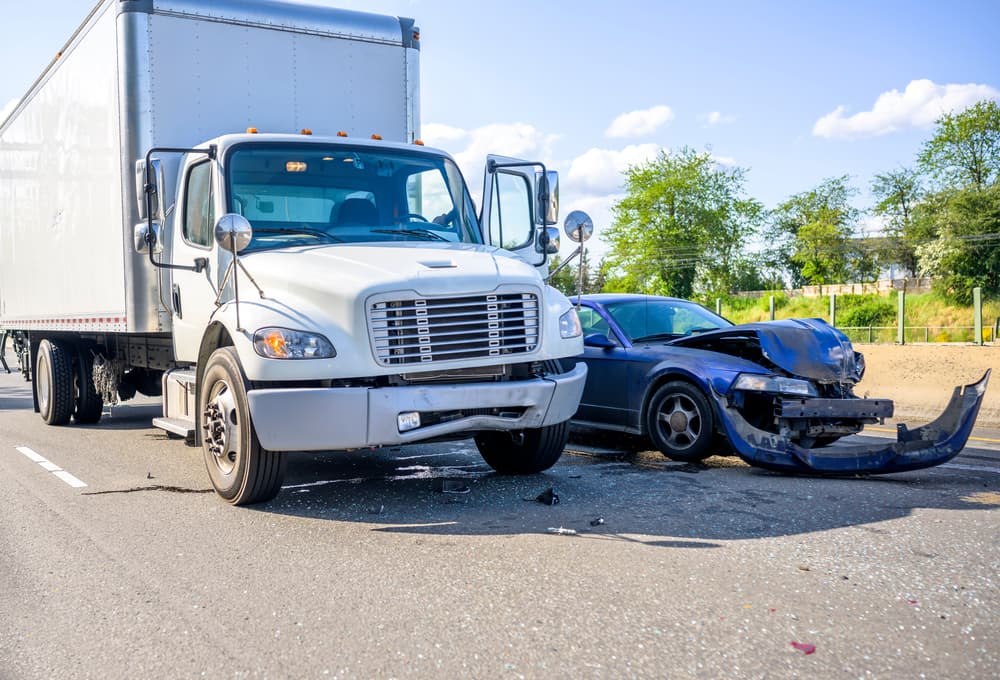Truck Accident Lawyer in Austin, Texas
Did a large truck hit and injure you in Austin, Texas? If the truck driver, trucking company, loading or maintenance company, or another entity’s negligence harmed you, hiring an Austin truck accident lawyer at Fletcher Law Office could help you seek the full and fair compensation you deserve.
Truck accidents often cause severe or catastrophic injuries, leaving victims with significant medical debt, weeks or months of unpaid wages, and debilitating pain and suffering. Gage Fletcher and his Austin truck accident lawyers at Fletcher Law Office understand the challenges these devastating incidents can present. Our lawyers provide individualized attention to each of our clients and pursue an aggressive strategy for maximum compensation in every case.
When your physical, financial, and emotional health is at stake, Just Get Gage. Turn to the Austin personal injury lawyers at Fletcher Law Office. Contact us today for your free, no-obligation case consultation.
- Truck Accident Lawyer in Austin, Texas
- Why Hire Fletcher Law Office After an Austin Truck Accident?
- What Makes Truck Accident Cases So Challenging?
- What Makes Trucking Accidents So Dangerous?
- How Many Commercial Trucks Drive In and Through Austin, TX? TX?
- How Many Austin, TX Truck Accidents Occur Each Year?
- What Laws Must Truck Drivers and Companies Follow in Austin, Texas?
- What Are the Primary Causes of Austin Truck Accidents?
- Who Can I Hold Responsible for My Injuries After an Austin Truck Accident?
- Investigating Truck Accidents
- How Much Compensation Can I Recover After an Austin Truck Accident?
- How Can My Austin Truck Accident lawyer Preserve Evidence After An Truck Accident?
- What Are Spoliation Letters And How Can I Use Them?
- What Should I Do After a Truck Hits Me in Austin?
- Contact Fletcher Law Office to Speak with an Experienced Austin Truck Accident Lawyer Today
- Fletcher Law Office, LLC

Why Hire Fletcher Law Office After an Austin Truck Accident?
The experienced truck accident lawyers at Fletcher Law Office fight for the rights of those injured in truck crashes in central Texas. Our founding attorney, Gage Fletcher, started the firm to provide compassionate representation for injured victims, no matter the size or scope of their case. He has built a team of experienced, aggressive advocates with a track record of winning significant compensation for our clients.
When you hire Fletcher Law Office to represent you, you get:
- A sophisticated legal team that utilizes proven, cutting-edge legal strategies.
- An aggressive advocate who knows the potential truck accident settlement worth, and how to negotiate with the trucking industry's insurance companies.
- Individualized attention from compassionate attorneys.
- Experienced trial lawyers with a successful track record of recovering hundreds of thousands of dollars for truck accident victims.
- Top-notch representation with no upfront fees. We only get paid if we recover compensation for you.
What Makes Truck Accident Cases So Challenging?
Truck accident injury claims are often more challenging than the average motor vehicle case. Determining what happened and who is responsible for paying for the harm and damage caused requires an experienced attorney with specific experience handling truck crash claims. Some of the reasons why a commercial truck accident case can be challenging include:
Truck Accidents Result in More Severe Injuries
Because commercial trucks weigh tens of thousands of pounds, they can inflict havoc on victims’ bodies when accidents occur. Truck accident victims often suffer far more severe truck accident injuries than they would in a collision with another passenger vehicle.

Common injuries from truck accidents include crushed or broken bones, traumatic brain injuries, spinal cord injuries, internal organ damage, and disfigurement. The medical bills that are often included in an Austin truck accident claim can be staggering. Hiring an Austin truck accident attorney is a great way to make sure you are protected from being stuck with the medical bills.
Truck Accidents Can Involve Multiple Liable Parties
After a truck accident, you might have difficulty determining who is responsible for your injuries. Is it the driver or their employer? Is the truck manufacturer partially responsible? Those are just a few potentially liable parties in a truck accident case. This is one way that commercial vehicle accidents differ from a normal car accident injury lawyer may approach a case. A truck accident settlement may be obtained with a number of different parties involved in the transport of goods. Other motor vehicle accidents usually involve one at fault party. An experienced attorney can help determine who was at fault. They can then pursue the at-fault party for compensation on your behalf.
Truck Accidents Require Thorough Investigations
Evidence is essential to successfully resolving any accident case, and truck accidents produce vast amounts of evidence. You need a sophisticated attorney who can identify, secure, analyze, and apply the evidence necessary to win your case.
What Makes Trucking Accidents So Dangerous?
Commercial truck accidents are some of the most dangerous on our roads. These large, heavy vehicles can cause catastrophic damage when they collide with smaller cars, motorcycles and pedestrians. The majority of truck accident claims involve some type of driver error, such as distracted driving, driving under the influence of drugs or alcohol, failure to obey traffic laws, or fatigued driving. Unfortunately, we see many of these factors at play in Austin truck accident cases.

In particular, evidence of a reckless truck driver that has caused an accident with passenger vehicles. The Federal Motor Carrier Safety Administration (FMCSA) has implemented numerous federal trucking regulations designed to reduce the risk of trucking accidents and keep our roads safe. Below is a list of nine reasons why trucking accidents are particularly dangerous and what safety measures should be taken by both drivers and companies to reduce their occurrence:
- Trucks are heavier and larger than smaller vehicles, leading to more severe injuries in collisions with other cars.
- The size of trucks can make it difficult for drivers to maneuver them quickly or safely.
- Poorly loaded cargo can cause a semi driver to lose control of their vehicle.
- Commercial truck drivers often drive recklessly due to tight deadlines and long hours on the road
- Trucks usually have poor visibility because of their height, making it harder for them spot hazards in the roadway
- Trucking companies may push their drivers too hard by expecting unrealistic delivery times from them
- Large trucks also require greater stopping distances than regular cars, so they're more likely to be involved in rear-end collisions
- Many commercial truckers use substances such as drugs and alcohol while on the job which increases their risk of causing an accident.
- Trucks are more prone to tire blowouts due to the extra weight they carry and the amount of wear and tear on their tires.
How Many Commercial Trucks Drive In and Through Austin, TX? TX?
The Texas Department of Transportation (TxDOT) commissioned a commercial vehicle survey for the Austin, Texas, area to forecast demand for this rapidly growing city.
According to the study:
- Texas authorities identified 32,000 registered commercial trucks in the Austin area.
- Sixty percent of registered trucks have a gross vehicle weight of 8,500 to 10,000 pounds.
- Approximately 27,972 cargo commercial vehicles operate within the Austin area daily.
How Many Austin, TX Truck Accidents Occur Each Year?
According to data from the TxDOT, 536 fatal accidents involving semi-trucks occurred in Texas in one recent year. Between Hays, Travis, and Williamson counties, 1,340 commercial motor vehicle accidents occurred that year, killing 36 people and injuring 579.
According to the Federal Motor Carrier Safety Administration (FMCSA), 19.35 fatal crashes occur for every one million Texans, slightly higher than the national average of 13.49.
What Laws Must Truck Drivers and Companies Follow in Austin, Texas?
Trucking companies and drivers must comply with various federal and state laws. If a truck driver or their employer violates a federal or state law resulting in an accident, their action or inaction could constitute negligence and make them liable for truck accident injuries.
Licensure and Training
Commercial vehicle drivers must comply with licensure and training requirements. Federal regulations establish the minimum standards, but state authorities issue commercial driver’s licenses.
In Texas, commercial truck drivers must complete the following to obtain a commercial driver’s license:
- Entry-level driver training with a registered provider
- Appropriate medical certification
- Hold a commercial license permit for at least 14 days
- Pass knowledge and skills tests
Alcohol and Drug Testing
Federal regulations require all large truck drivers to comply with drug and alcohol testing protocols:
- Pre-employment testing. New drivers must receive a negative test result before their employer can permit them to operate a commercial vehicle.
- Post-accident testing. All truck drivers must comply with drug and alcohol testing within eight hours of an accident resulting in a fatality, traffic violation, or disabled vehicle.
- Random testing. Trucking companies must implement random drug testing of drivers when they are on duty or immediately before or after coming on duty.
- Reasonable suspicion. Supervisors can direct a driver to receive drug or alcohol testing if they observe suspicious behaviors or appearance.
Insurance Requirements
Federal regulations set the minimum liability insurance commercial motor carriers must carry:
- $750,000 for for-hire carriers of property with a gross vehicle weight rating of 10,001 or more pounds
- $5 million for for-hire and private carriers of hazardous substances with a gross vehicle weight rating of 10,001 pounds or more
- $1 million for for-hire and private carriers of oil with a gross vehicle weight rating of 10,0001 pounds or more
Hours of Service
Truck drivers must comply with federal hours-of-service regulations, including:
- 11-hour driving limit after ten consecutive hours off-duty.
- 14-hour on-duty limit.
- 30-minute driving break after eight cumulative hours of driving.
- 60-hour driving limit in seven consecutive days or 70-hour driving limit in eight consecutive days.
Inspection, Repair, and Maintenance
Trucking companies and drivers must systematically inspect, repair, and maintain their trucks, including inspections and inspections before and after each trip.
What Are the Primary Causes of Austin Truck Accidents?
According to a causation study conducted by FMCSA, driver error caused 87 percent of large truck crashes, followed by vehicle errors (10 percent) and environmental factors (3 percent).

Common driver errors that contribute to Austin truck accidents include:
- Fatigued driving. According to FMCSA, 68 asleep or drowsy drivers killed someone in accidents in one recent year. The danger of fatigued driving led federal and state regulators to institute hours-of-service regulations for semi drivers. Failing to comply with these regulations is illegal and potentially deadly.
- Drunk or drugged driving. According to FMCSA data, 2.8 percent of truck drivers involved in fatal crashes had a blood alcohol concentration of 0.08 percent or greater. Furthermore, 299 trunk drivers involved in fatal crashes tested positive for at least one drug. Not only is drunk and drugged driving illegal for all drivers, but it also diminishes drivers’ judgment, coordination, and reaction time.
- Distracted driving. According to FMCSA, 248 truck drivers involved in fatal crashes engaged in at least one distraction-related behavior. Examples of distracted driving behaviors include talking on the phone, eating, and texting.
- Speeding. According to FMCSA, 351 truck drivers were speeding when they caused fatal crashes in one recent year. A fully loaded semi-truck traveling at 65 miles per hour can take 525 feet, or the length of two football fields, to stop. That truck can inflict significant damage to numerous nearby vehicles as its attempting to stop.
- Driver inexperience. According to a survey of long-haul truck drivers conducted by the National Institute of Occupational Safety and Health, 38 percent of drivers perceived their entry-level training as inadequate. Unfortunately, most trucking companies prioritize profits over safety. Therefore, they rush to put novice drivers on the road immediately before they gain essential experience.
Who Can I Hold Responsible for My Injuries After an Austin Truck Accident?
If someone else’s negligence caused your injuries, you might be able to hold them financially responsible.
Depending on your case, you may hold liable:
- Truck driver. You may hold the truck driver liable for your injuries if their negligence caused the accident. Examples of truck driver negligence include distracted driving, drunk or drugged driving, speeding, following too closely, failure to yield the right-of-way, disobeying traffic lights or signs, and violating traffic laws and regulations.
- Trucking company. Trucking companies must ensure their drivers have their licenses, get proper training, and comply with laws and regulations. Furthermore, they must ensure their trucks are well-maintained and correctly loaded. You may hold trucking companies responsible for their driver's negligence and their negligence in allowing inexperienced, untrained, or unfit drivers to operate on the roadways.
- Truck manufacturer or maintainer. You may hold truck manufacturers liable if one of their trucks malfunctions and causes an accident. If the truck malfunctions due to inadequate or improper maintenance, you may be able to hold those who do the truck maintenance responsible for your injuries.
- Another driver. Other drivers besides truck drivers can cause accidents involving large trucks. For example, suppose a driver in a blue passenger car runs a red light at an intersection. If a truck driver hits you while attempting to avoid a collision with the blue car, you may hold the driver of that vehicle financially accountable for your injuries.
Investigating Truck Accidents
Truck accident cases are much different than car accident cases, for a wide range of reasons. One is related to the increased amount of exposure faced by the insurance company. Trucking companies are often required to carry an increased amount of liability coverage.
Because of this, the amount that you can potentially collect in damages is often increased. In other words, with the increase in available insurance limits, there is a larger policy of coverage that you could potentially collect from. This all leads to trucking accident liability cases often being high stakes and including a great deal of investigation to hold the insurance carrier accountable to get you the compensation you deserve.
You will need a substantial amount of evidence to properly secure your claim against the trucking company. Preserving this evidence early after a truck accident injury is ultimately what may make your case successful or not. It is key to winning personal injury lawsuits and obtaining the compensation that victims deserve. In the aftermath of such an event, there are many logistical and legal steps that must be taken in order to protect one’s rights. One of the most important is preserving evidence related to the incident.
"Black Box" Data
Black box data is a type of recording device found in semi trucks that captures vital information about the operation of the vehicle. It records thing such as:
- Speed
- Acceleration
- Steering and braking input
- Seatbelt use and whether or not the driver was wearing their seatbelts
- Maintenance data
- Fuel economy readings

This data is stored on an internal memory card that can be accessed by authorized personnel for inspection purposes. The black box records a wealth of data which can be used to help identify what happened before, during, and after a crash. This includes vehicle speed at the time of impact; whether brakes were applied; whether the driver had taken evasive action such as swerving; whether headlights were engaged; road conditions; weather conditions; activity inside the cab prior to impact; and more.
In addition, GPS tracking within the truck allows for precisely determining where a semi-truck is at any given moment. By combining this with video recordings from dash cams onboard several trucks can provide invaluable evidence in accident investigations.The installation of black boxes in semi-trucks has been shown to greatly reduce the likelihood of an accident taking place because it helps detect risky driving behavior before it becomes a problem. Drivers are encouraged to drive more safely if they know they are being monitored at all times due to this technology. Furthermore, should an accident occur black box data provides crucial evidence for legal proceedings against trucking companies should negligence or fault be determined during an investigation into the cause of an event.
Truck Driver Logs
Truck driver logs are an important piece of evidence in truck accident cases. These detailed records are kept by professional drivers, detailing key metrics such as:
- Length of their journey
- The truck driver's route
- Rest periods,
- Other pertinent transportation information.
Driver logs provide specific information as to when a driver started and stopped driving, providing precise times and dates when they left one location and arrived at another. This can also tell if they stopped for rest breaks, meals, refueling stops or anything else that may be pertinent to the case. The log book also details the number of hours worked per day and how many consecutive hours were driven without stopping for rest.

In some cases, GPS tracking can be used to corroborate data found in driver logs as well. When this is combined with black box data from a truck it can be incredibly helpful in determining what happened before, during and after an accident took place. Moreover, these records provide insight into overall fatigue levels which could play an important role in whether negligent behavior was present on behalf of a driver or company at the time of an accident.
In addition to helping understand certain aspects leading up to an accident such as fatigue levels or lack of quality sleep on part of a driver - driver logs can also be used to prove the total amount of time spent driving throughout any given period.
This can help reveal violations made by truck companies when it comes to regulations for how much time should elapse between scheduled breaks during long-distance hauls. Furthermore, it gives insight into how many hours were spent on the road overall versus off-duty periods away from the wheel which may come into consideration under certain circumstances related to safety compliance laws.
Bills of Lading
In trucking injury cases, Bills of lading are important documents for truck drivers, as they outline the nature and contents of the goods to be transported. These documents must be completed before goods are loaded onto a truck or trailer, and they provide legally binding evidence of a carrier’s responsibility for delivery and protection of the goods in its care.
The bill of lading includes information such as the name and address of each party involved in the shipment, description and number of packages being shipped, weight and volume measurements, destination, special instructions for handling or delivery, and signatures from both parties.

Typically, bills of lading are printed on specialized forms that include important legal language that absolves carriers from certain liabilities for damaged cargo or delays during transit. Once signed by both parties (the shipper/consignee and the carrier), these documents serve as proof-of-delivery documentation which is necessary when dealing with insurance companies in case something goes wrong during shipment.
They also provide evidence documenting payment arrangements between these two parties, which helps settle any potential disputes that may arise afterwards. In addition to providing legal protection to carriers, bills of lading also allow customers to track their shipments throughout the entire delivery process.
In some cases, there may be additional requirements on bills of lading depending on what is being transported in order to comply with government regulations or trade agreements. For example, if hazardous materials are being shipped then additional details regarding safety measures must be outlined in the document in order for it to be considered legally valid. Bills of lading thus play an essential role in ensuring safe transportation operations between shippers/consignees and carriers alike.
Corporate Representative Deposition
In trucking accident cases, corporate representative depositions provide an opportunity for attorneys to gain valuable information regarding the policies and procedures of a company, as well as any other relevant information pertaining to the case.

This type of deposition can be used to uncover important details such as safety protocols, training requirements, driver log records, GPS tracking data and bills of lading. All of this evidence can help reveal whether negligent behavior was present on behalf of a driver or company at the time of an accident. Moreover, corporate representative depositions also provide insight into how a certain situation was handled by the company afterwards, which could be beneficial for legal proceedings depending on the circumstances.
Truck Driver Employee Handbooks
For bringing your injury claim forward, truck driver employee handbooks are an important resource for truck drivers as they provide specific information regarding the company policies and procedures that must be followed during their job.
- These handbooks contain detailed instructions on everything from safety protocols to proper loading and unloading techniques to regulations concerning driver logs. They also provide important information about how to handle various types of cargo, as well as tips for avoiding common issues such as fatigue, distraction, or other dangerous behaviors while on the road. Additionally, these handbooks will often include useful contact information in the event of accidents or emergencies.
- Driver employee handbooks typically start off with a section outlining each company’s mission statement and core values. This is then followed by general policies related to workplace conduct and expectations that all employees should meet. This includes dress codes, communication guidelines, drug/alcohol testing requirements, and more. After this comes sections discussing more specific topics pertaining to trucking operations such as load securement methods and loading dock safety measures.
- It is also common for these handbooks to include sections dedicated to safety regulations governing hours-of-service (HOS) laws or hazardous material transportation rules - both of which are heavily enforced in order to protect the public from potential hazards due to negligent driving practices.
- Finally, many driver employee handbooks will conclude with sections outlining the processes for filing grievances or complaints against management or fellow drivers alike – this helps ensure a safe work environment free of discrimination or harassment. More importantly though, these documents help enforce a standard of care in transporting loads for the company – thus helping keep truck drivers accountable when it comes to upholding certain regulations that are necessary for safe transportation operations throughout the country.
Deposing the Truck Driver
Having your Austin truck accident lawyer depose the truck driver in your truck accident claim is a critical step in obtaining justice and getting the right compensation for any serious injuries suffered. Depositions of these kind of key characters can provide key evidence that could prove your case and help you get a favorable outcome.
In a deposition, the truck driver will be required to answer all questions posed by the lawyer under oath. This process can uncover vital information about the incident, such as whether or not they were actually driving at excessive speed or if they were distracted while on the road. It can also reveal other pertinent information related to how long they have been driving and what type of training they received before operating a commercial vehicle.
Using The Truck Driver’s Statement
Deposing the truck driver and getting their statement first hand allows for more comprehensive investigation into truck accidents than merely relying on police reports or eyewitness accounts. Your truck accident lawyer can ask specific questions about the incident, which can help determine exactly what happened during the accident. This way, fault won’t be placed on anyone without sufficient proof and facts from both sides.
Through this process, your attorney also has an opportunity to gain insight into the driver’s state of mind when the incident occurred. It is possible that certain reckless behaviors or distractions may have caused them to make unsafe decisions leading up to the crash. For instance, by deposing a truck driver found guilty of speeding, it could be revealed that their cargo was improperly secured prior to impact and thus contributed to the severity of damage in an accident.
At any rate, having your truck accident lawyer depose a truck driver involved in an accident is beneficial in establishing liability, allowing for appropriate compensation amounts to be determined more accurately after considering all available evidence. Beyond that, it will also help protect drivers from being wrongfully blamed for an incident whose details are unclear or incompletely recorded by law enforcement personnel who responded to the scene.
How Much Compensation Can I Recover After an Austin Truck Accident?
The compensation you may recover after an Austin truck accident depends on several factors, such as the strength of evidence in your case and the severity of your injuries.
Furthermore, to recover maximum compensation, you need the assistance of an experienced Austin truck accident lawyer with a proven track record of securing significant truck accident settlements for their clients.

The truck accident lawyers at Fletcher Law Office have an outstanding track record of successful verdicts and settlements. We stand ready to help you seek compensation for your accident-related losses.
This could include:
- Current and future medical expenses to treat your injuries, including inpatient and outpatient treatment, surgery, physical therapy, medication, and medical equipment
- Lost wages and work-related benefits
- Loss of future earning capacity if your injuries prevent you from returning to your job
- Property losses, such as car repairs or replacement
- Pain and suffering
- Loss of consortium
- Loss of quality of life
- Loss of companionship
How Can My Austin Truck Accident lawyer Preserve Evidence After An Truck Accident?
For a truck accident victim, it is paramount to collect evidence at the scene as soon as possible. This is a main component of personal injury law, and is needed to protect your truck accident lawsuit rights. This may include photographs of the damage inflicted on vehicles or injuries sustained by people involved, video footage of traffic patterns or weather conditions at the time, contact information for all parties and witnesses, and any other relevant data.
All this information should be collected before any repairs are made or vehicles are removed from the scene. Speaking with one of our local Austin truck accident attorneys will give you a chance to learn more about what is required.
What Are Spoliation Letters And How Can I Use Them?
In order to collect the vital information and evidence that the trucking company may have, it is critical to hire a truck accident lawyer so that a spoliation letter may be sent immediately.
- A spoliation letter is an official written notice used in trucking accident cases. It is sent to the legal representatives of any company or driver involved in the crash, informing them that they have a duty to preserve all relevant evidence and documentation related to the case. This includes documentation such as vehicle logs, inspection records, photos of the crash scene, data from black boxes and other vehicle tracking technologies, and witness statements.
- Spoliation letters are important because they ensure that important evidence is not lost or destroyed before it can be used in a lawsuit. Evidence must be preserved for its value to be considered by a court. If it has been destroyed or altered in any way, it could lead to serious legal implications for those involved.
- Spoliation letters often cite statutes and court rules that require certain forms of evidence to be preserved while litigation is pending. These rules also provide sanctions against parties who fail to abide by these requirements and destroy important evidence before it can be evaluated by a court. If a party is found to have destroyed critical evidence after receiving a spoliation letter, the court may draw negative inferences about their liability for the incident or even dismiss their case altogether. An accident lawyer can draft the spoliation letter and make sure it is delivered to the correct party.
- The spoliation letter will usually ask recipients to preserve all tangible objects associated with the accident as well as any digital records related to it including emails, text messages and other electronic communications which may contain information about what happened at the time of the incident. The sender may also request copies of operational documentation such as documents verifying maintenance records, driver training records and licenses. This allows both sides of a case to gain access to pertinent information without having to wait for lawyers and investigators to collect it through discovery requests after litigation has already begun.
- In addition, some states, such as Texas, have enacted laws which impose sanctions on parties who fail to comply with spoliation letters issued prior to litigation beginning. Such sanctions may include fines or payment for attorneys’ fees incurred due to noncompliance with the letter’s terms. Therefore, it is important for companies involved in trucking accidents who receive spoliation letters take heed of their contents carefully so that they do not face potential legal ramifications down the line if they fail adhere its requirements properly.
What Should I Do After a Truck Hits Me in Austin?
You might be wondering what to do next if you recently suffered injuries in an Austin truck accident.
Fletcher Law Office recommends:
- See a doctor. If you have not already seen a doctor for your injuries, do so immediately. Any delay puts your health at risk and jeopardizes your right to compensation. If you wait too long, the insurance company might argue that the crash did not cause your injuries.
- Don’t talk to the trucker’s insurance company. The truck driver's insurance company will act quickly after an accident. They might blame you or offer a lowball settlement within hours or days of the accident, hoping you are vulnerable and desperate enough to accept it. These quick settlements are often a fraction of the amount you could receive with a lawyer's help.
- Consult an Austin truck accident lawyer at Fletcher Law Office. A truck accident can overwhelm you. You cannot manage a legal claim when you struggle physically, emotionally, and financially. You need our Austin truck accident lawyers to advocate for you. Working with an experienced truck accident attorney will help kickstart your truck accident claim.

Contact Fletcher Law Office to Speak with an Experienced Austin Truck Accident Lawyer Today
If a negligent trucker, trucking company, or another entity injured you, just get Gage! Contact the Austin truck accident lawyers at Fletcher Law Office today to learn how our lawyers can help you through this difficult time. We stand ready to help you seek the money you need to get treatment, pay your bills, and move on with your life. Let us handle the legal legwork while you focus on your health.
Call Fletcher Law Office at (512) 619-4006 or contact us through our website for your free case evaluation today.